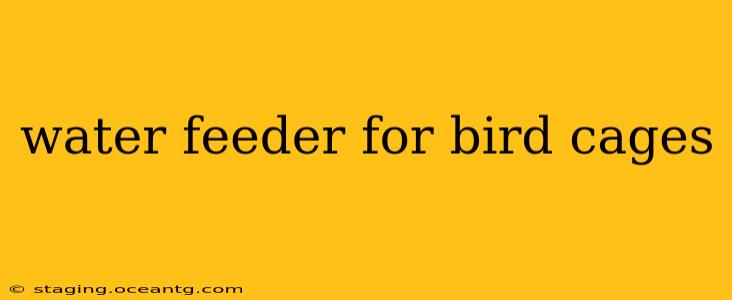Keeping your bird hydrated is crucial for its health and happiness. A reliable water feeder is essential, but with so many options available, choosing the right one can feel overwhelming. This guide dives deep into the world of bird cage water feeders, helping you select the perfect one for your avian companion. We'll cover various types, their pros and cons, and factors to consider to ensure your bird always has access to fresh, clean water.
What are the Different Types of Bird Cage Water Feeders?
Several types of water feeders cater to different bird species and cage setups. Understanding these differences is key to making an informed decision.
1. Bottle Waterers: The Classic Choice
These are the most common type, featuring a bottle filled with water that dispenses through a small spout. They're generally inexpensive and easy to clean. However, they can be prone to leaks and might not be suitable for all birds, especially those who are messy drinkers.
Pros: Affordable, readily available, simple to use. Cons: Can leak, might not be ideal for all birds, water level isn't always easily visible.
2. Dish Waterers: Simple and Accessible
These are simple, open dishes that provide easy access to water. They're great for smaller birds and those who prefer to bathe in their water. However, they're more prone to contamination from droppings and spills.
Pros: Easy access for birds, simple to clean. Cons: Easily soiled, prone to spills, not ideal for larger birds.
3. Gravity Waterers: Constant Supply, Minimal Mess
Gravity waterers utilize a reservoir that feeds water into a drinking cup. This ensures a constant supply of water, minimizing the need for frequent refills. They're generally less prone to spills than dish waterers.
Pros: Consistent water supply, reduces spills, easy to monitor water level. Cons: Can be more expensive than bottle or dish waterers, slightly more complex to clean.
4. Automatic Waterers: The Ultimate in Convenience
These feeders automatically refill the water supply, eliminating the need for constant monitoring and refilling. They are particularly convenient for busy owners.
Pros: Automatic refills, less maintenance, great for busy owners. Cons: More expensive, require electricity or batteries, may be more complex to clean.
How Often Should I Change My Bird's Water?
How often should I change my bird's water? This is a crucial question for maintaining bird health. You should change your bird's water at least once a day, ideally twice. Always use fresh, clean, and chlorine-free water. Standing water can become a breeding ground for bacteria, potentially harming your bird.
What Kind of Water is Best for Birds?
What kind of water is best for birds? Birds need fresh, clean, and preferably filtered or bottled water. Avoid tap water, as the chlorine and other chemicals can be harmful. You can also use purified water.
How Do I Clean a Bird Waterer?
How do I clean a bird waterer? Cleaning your bird's waterer regularly is essential for hygiene. Wash it thoroughly with warm, soapy water, ensuring to rinse it completely before refilling. You can use a bird-safe disinfectant, following the instructions carefully. Never use harsh chemicals that could harm your bird.
What Size Waterer Do I Need for My Bird?
What size waterer do I need for my bird? The size of the waterer will depend on the size and number of birds in your cage. A larger bird will require a larger waterer than a smaller bird. Ensure the waterer is appropriately sized to prevent spills and provide ample water for your bird(s).
Choosing the Right Waterer: Factors to Consider
- Bird Species: Different species have different drinking habits and preferences. Some birds are messy drinkers, while others are more precise.
- Cage Size: A larger cage may require a larger waterer.
- Ease of Cleaning: Choose a waterer that is easy to clean and maintain.
- Durability: Select a waterer made from durable, non-toxic materials.
- Budget: Prices vary greatly, so consider your budget when making your choice.
By carefully considering these factors, you can select the ideal water feeder to ensure your feathered friend stays happy and healthy. Remember, providing fresh, clean water is a vital part of responsible bird ownership.
